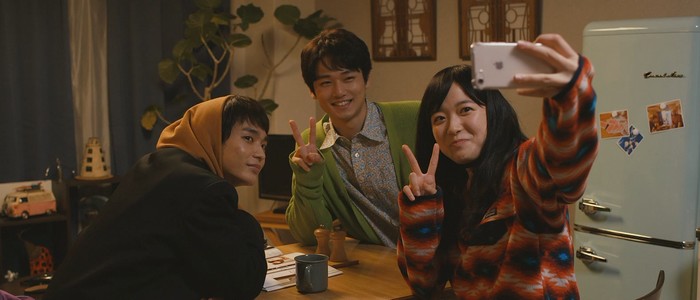
More Than Words is a Japanese BL drama about three best friends in a love triangle over the years. The aromantic female protagonist befriends a popular classmate, even though she isn't interested in dating him. Later, they welcome a gay coworker to their social circle. The trio gets along splendidly, forming a close bond from high school to adulthood. Yet, their relationship reaches an emotional turning point that threatens to drive them apart.
Supported by subtle writing and brilliant acting, More Than Words unleashes powerful emotions with its sensitive relationship drama. This sophisticated story is masterful at navigating the blurry lines between friendship, romance, and family. Although not a conventional BL series, it features gay characters and highlights their thoughtful experiences. Each protagonist goes through a nuanced journey that explores sentimental themes.
More Than Words Summary
Title:
モアザンワーズ
Series Info:
Japan (2022)
Genre:
Drama
About:
More Than Words is a mature & interesting drama.
Plot
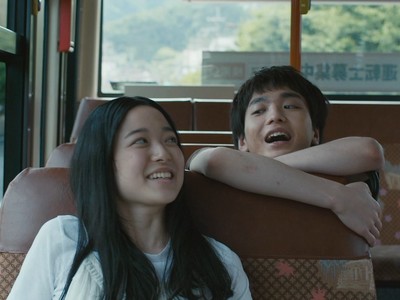
Mieko is a 16-year-old high school student in a single-parent household. She has recently moved to a new neighbourhood, and the other students gossip about her being a delinquent. Mieko lives with her divorced mother, who's busy with work and barely pays attention to her child. Her father left the family, traumatizing Mieko to this day. She suffers from abandonment issues and feels self-conscious about growing up without a dad.
Mieko is in a relationship with an abusive boyfriend. One night, he became physically violent when she refused sex, prompting Mieko to flee. Makki, a classmate from school, is concerned after noticing her face injury. He keeps her company, even though they don't know each other. Makki advises his new acquaintance to leave her scumbag boyfriend, which she does. After the breakup, Mieko vows she'll never date again for the rest of her life. Makki believes her views seem too extreme, but Mieko seems adamant about swearing off romance forever.
Makki and Mieko begin hanging out on campus, drawing attention from the other students. Everyone thinks they must be dating, even though they are just friends. The free-spirited Makki is a popular guy at school, especially with the girls. However, he doesn't seem interested in dating them, insisting they are too childish. Mieko's cliquish classmates alienate her because they feel jealous of her platonic bond with Makki. Only Sakaki is the exception. Sasaki has a crush on Makki, but she befriends Mieko to get closer to him.
Makki and Mieko want to be finally independent. They get hired for a part-time job at a restaurant. They get along with the 22-year-old Eiji, who works as a chef. After overhearing their gossip, Eiji tells Makki and Mieko that he identifies as gay. However, his sexuality is a recent revelation for him. Eiji is shy and anxious, struggling to connect with other gay guys. Eiji used to be bullied at school and didn't have many friends. However, he gets along with his younger coworkers despite their age difference.
Eiji develops a close bond with Makki and Mieko. Eventually, the trio starts hanging out outside work, enjoying all their time together. Mieko cherishes her platonic friendship with Mieko and Eiji, who provide emotional support in place of her absentee parents. One day, Eiji confides in Mieko that he has a crush on Makki. However, they don't know whether Makki is attracted to guys. Eiji is too nervous about confessing his love, but Mieko gives him advice and encouragement. Simultaneously, Mieko questions her feelings and contemplates what Makki means to her.
More Than Words Cast
Characters
Mieko
Ryoko Fujino (藤野涼子)
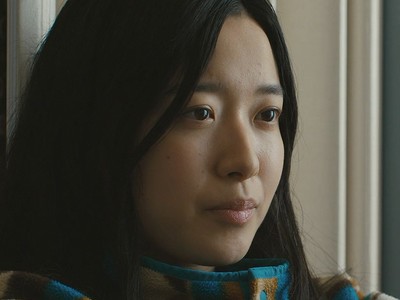
Mieko is a sixteen-year-old high school student from a single-parent home. She lives with her divorced mother, who hardly pays attention to her. Mieko's father abandoned his family. Since moving to a new neighbourhood, Mieko's first friend is Makki. The two have a platonic relationship, even though everyone thinks they are dating. Mieko's favourite snack is kaki-pi.
Ryoko Fujino
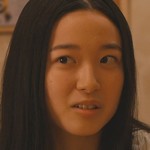
Ryoko Fujino (藤野涼子) is a Japanese actress. She is born on February 2, 2000. She starred in the 2022 series, More Than Words.
Makki
Yuzu Aoki (青木柚)
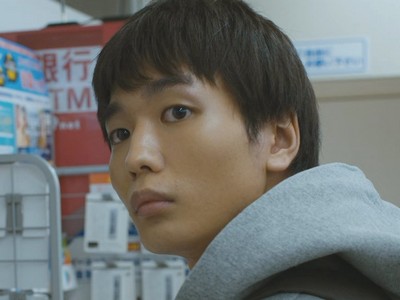
Makki is a sixteen-year-old high school student. He goes to the same school as Mieko, although they are in different classes. Makki befriends Mieko after she was hurt by her abusive boyfriend. With a cheerful and free-spirited personality, Makki gets along with everyone at school. Many girls have a crush on him, but he isn't interested in dating them.
Yuzu Aoki

Yuzu Aoki (青木柚) is a Japanese actor. He is born on February 4, 2001. His first BL project is the 2019 series, Shujin-ko. Yuzu starred in the 2022 BL drama, More Than Words.
Eiji
Daisuke Nakagawa (中川大輔)
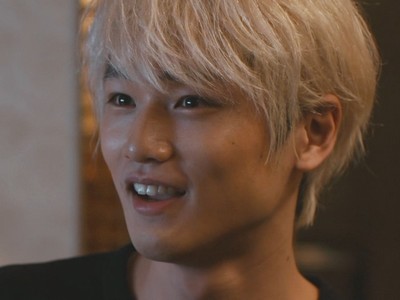
Eiji is a 22-year-old chef who works with Mieko and Makki at the restaurant. Eiji recently discovered his attraction to men, but he isn't entirely comfortable with his sexuality yet. He used to be bullied at school and didn't make many friends. Eiji comes from a wealthy family and has a good relationship with his older sister, Anna.
Daisuke Nakagawa

Daisuke Nakagawa (中川大輔) is a Japanese actor. He is born on January 5, 1998. His first BL project is the 2022 BL drama, More Than Words. He has a starring role in the 2025 BL drama, Love Begins in the World of If. He also has a supporting role in the 2025 crime drama, Tokyo Salad Bowl.
Asato
Daiki Kanechika (兼近大樹)
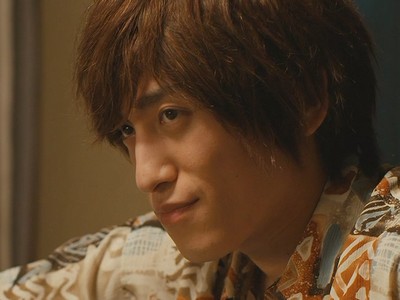
Asato is Makki's neighbour who lives alone. He went to the same high school as Mieko and Makki. However, Asato was a quiet kid who kept to himself. Growing up, he didn't have a good relationship with his stern grandfather. Asato moved out of home and started training as a hairdresser to support himself financially.
Daiki Kanechika
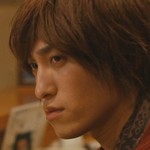
Daiki Kanechika (兼近大樹) is a Japanese actor. He is born on May 11, 1991. His first BL project is the 2022 BL drama, More Than Words.
Supporting Cast

Sakaki
Ai Mikami (見上愛)

Anna
Hirona Yamazaki (山崎紘菜)
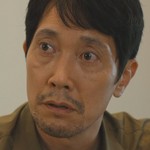
Eiji's dad
Kuranosuke Sasaki (佐々木蔵之介)
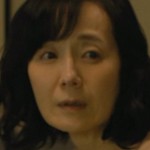
Eiji's mom
Sanae Miyata (宮田早苗)

Mieko's mom
Rie Tomosaka (ともさかりえ)

Chisa
Yura Anno (安野澄)

Restaurant owner
Tomokazu Seki (関智一)
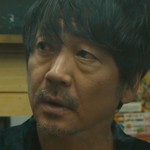
Eiji's boss
Nao Omori (大森南朋)

Asato's boss
Genki Nakamura (中村元気)

Asato's brother
Takumi Saito (斎藤工)
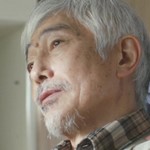
Asato's grandfather

Shiho
Cast Highlights
Yuzu Aoki
Makki's actor is one of the actors in the 2019 Japanese series Shujin-ko, which has a gay storyline.
Daisuke Nakagawa
Eiji's actor is lead of the 2025 Japanese BL fantasy drama, Love Begins in the World of If.
More Than Words Review
Review
Drama Review Score: 9.0
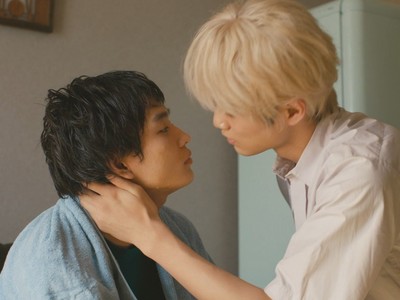
More Than Words shows how interesting a love triangle can be when it's done right. It handles all the relationship drama thoughtfully, using sensitive characters with deep backstories. However, the series is about more than just romance. It examines the many layers of friendship. It also explores all kinds of sexuality. Plus, it offers some insightful commentary about society. More Than Words has many sentimental messages and sophisticated themes that go beyond what you usually see in the BL genre.
Aside from all the big ideas, More Than Words is a brilliant drama because of its subtlety. It relies on quiet subtext and ambiguous expressions to tell its story. The plot drops hints instead of stating the obvious, so you must speculate carefully and analyze the relationship dynamics. This introspective series inspires you to put yourself in each character's shoes. What are they thinking? How are they feeling? The title, More Than Words, refers to the unspoken emotions that viewers can only understand through empathy.
At the start, More Than Words focuses on building the bond between the three leads. It's great how well they get along despite their differences, so Mieko's gender or Eiji's age never gets in the way of their friendship. I love their bonding scenes together because they have such a gentle, relaxing vibe. But then, Episode 6 drops a huge bombshell into the plot, ruining the peaceful mood. The trio goes ahead with a senseless plan that baffles me. More Than Words doesn't handle the melodramatic storyline with enough finesse, making me think less of this intelligent series.
More Than Words has an incredibly talented cast. Mieko's actress (Ryoko Fujino) portrays her character with such poise and vulnerability. She carries her scenes with quiet dignity, so Mieko shows inner strength even in her fragile moments. Likewise, Makki's actor (Yuzu Aoki) handles the duality in his role so well. His bubbly personality is convincing, but his sadder moments are just as captivating. While Eiji's actor (Daisuke Nakagawa) isn't on the same level as his costars, everyone still shares a very comfortable chemistry together.
Yes, More Than Words has BL content. The series features gay characters who have plenty of romantic moments together. You'll be pleased to know they have a well-rounded relationship with both physical and emotional affection. The plot shifts all its focus to this pairing in the last few episodes, so most intimate exchanges happen near the end. More Than Words may not fall into the BL genre because it offers more than just LGBTQ+ drama. Nonetheless, the love story is still a big part of it. I feel satisfied with the gay couple, even if they didn't wow me.
More Than Words is a polished production with cozy visuals and a soothing soundtrack. I especially love how it designs the ending credits. Almost every episode ends with an extended scene where the characters do ordinary activities and live in the moment. As the events unfold quietly, the series encourages you to just watch and think. This technique is a great example of how clever More Than Words is, choosing subdued storytelling over flashy moments. This thought-provoking drama can evoke powerful emotions without whispering a single word.
Summary
Sophisticated story
More Than Words has a thought-provoking story that explores friendship, romance & many meaningful themes. It relies on subtle hints and understated subtext to convey its sentimental messages.
Sensitive romance
There is a BL romance in More Than Words, even if the gay relationship isn't the primary focus. The couple becomes prominent in the last few episodes, sharing numerous intimate exchanges.
Brilliant acting
Mieko's actress (Ryoko Fujino) portrays her role with quiet dignity and inner strength. Likewise, her costar (Yuzu Aoki) balances his bubbly persona with persuasive dramatic performances.
Happy ending
More Than Words has a happy ending where the characters resolve the long-lasting conflict and mend their friendship. Their bond will never be the same, but at least they're trying to reconcile.
Subtle artistry
This series displays exquisite artistry with cozy visuals & soothing soundtracks. The ending credits are inspired. Each episode shows the characters in an extended scene, entirely without dialogue.
90%
More Than Words explores the compelling dynamics of a love triangle. This sensitive drama contains brilliant themes, sentimental messages, sympathetic characters, and poignant emotions.
More Than Words Series Explained
Analysis
- Mieko
- Aromanticism
- Family trauma
- Mieko and Makki
- Platonic friends
- Eiji
- Eiji's sexuality
- Makki and Eiji
- Third wheel
- Homophobic dad
- Surrogacy
- Conformity
- Hair
- Outsider
- Family bonds
- Makki
- Makki and Asato
- Asato vs Eiji
Mieko
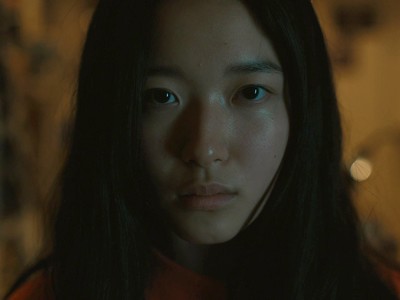
Ironically, More Than Words is a love story led by an aromantic female protagonist. Mieko seems averse to dating, shows no sex drive, and her asexuality is the starting point of the plot. In Episode 1, she tells Makki, "I'm not getting a boyfriend for the rest of my life." Makki thought it was an extreme statement stemming from the trauma of her abusive relationship. However, Mieko meant what she said. Being touched & getting mushy are unappealing concepts to her. She tried romance once, but it was enough. That isn't what fulfilled Mieko in life.
Mieko speaks vaguely about her asexuality twice in the series. She confides in Makki during Episode 1 and makes similar references to Sakaki in Episode 4. Mieko chooses her words carefully in both exchanges and observes her partner's reaction. She wants to test the waters for coming out to them. However, Makki and Sakaki don't pick up on her subtle comments. Since they don't reciprocate the conversation, Mieko retreats and doesn't open up about herself. She has learned to internalize her aromanticism and asexuality, knowing that others cannot relate to her experiences.
Aromanticism
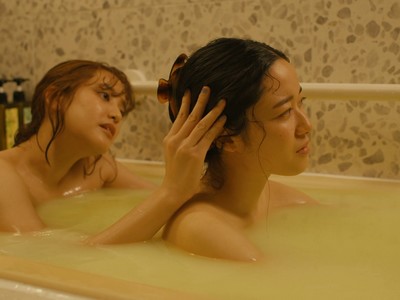
More Than Words portrays Mieko sympathetically, handling her character with delicate care. Her aromanticism is a secret strength in some ways. It gives her clarity and understanding about how valuable platonic friendships are. Once Mieko lets her guard down, she's warm, compassionate, and fiercely loyal to her social circle. She maintains lifelong connections with everyone in the cast, highlighting her ability to get along with people. Although Mieko doesn't want a romantic partner, she builds meaningful relationships cherished with all her heart.
Yet, there's no denying that being aromantic and asexual affected Mieko's life. Traditional society expects us to settle down with a romantic partner, which Mieko has no desire to do. As her peers talk about dating and love confessions, she feels self-conscious about not fitting in with the norm. In Episode 3, Anna gives a harmless compliment that surprisingly upsets Mieko. Being called "cute" touches upon her insecurities. Mieko thinks that cute girls are coupled up in loving relationships. From her perspective, this endearing term isn't reserved for aromantic loners like her.
Likewise, Mieko's asexuality weighs on her mind. In Episode 4, she discovers Makki & Eiji are sexually active, making her the third wheel in their friendship. Afterwards, we hear her thoughts: "The two of them have their own world, a place I cannot get into." Mieko continues to say she isn't lonely, and this solitude is what she desires. Her monologue is powerful. Mieko understands she's different, like an outsider from traditional society. Yet, she feels self-assured about leading a life without sex or romance. The scene ends with Mieko declaring, "I've found what I wanted."
Family trauma
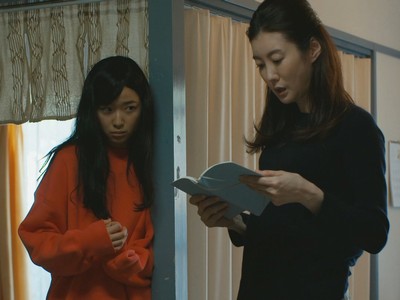
Mieko is a sixteen-year-old girl coming to terms with her aromanticism and asexuality. However, that isn't the only struggle in her life. Mieko is also coping with family trauma. She suffers abandonment issues from a deadbeat father who walked out on his wife and daughter. We don't know what happened to him, but it's enough to drive Mieko's mom to the karaoke bar every night. She chooses to sing songs and get drunk instead of staying home to care for her child.
With two absent parents, Mieko doesn't experience the warmth and support that other teens receive in loving households. Her broken home is definitely a touchy subject. When Sakaki talks about her protective dad, Mieko grows pensive from the reminder of what's missing in her life. Likewise, Episode 4 has a clever scene where Eiji's parents arrive. Everyone gathers in the kitchen except for Mieko, who distances herself and observes the cheerful family interactions from afar. A curious smile crosses her face. What must she be thinking at this moment?
Growing up, Mieko feels deprived of her parents' love. The dad abandoned her, while the mom ignored her. This family trauma causes unspeakable loneliness in Mieko's heart. Typically, most people fill the void with other relationships. However, it's harder for Mieko because of her aromanticism. She wants a companion but not a romantic partner, even though these roles often overlap. Fortunately, Mieko meets Makki and Eiji, who become more than just her friends. They're Mieko's entire support system, compensating for the lost love that her family couldn't provide.
Mieko and Makki
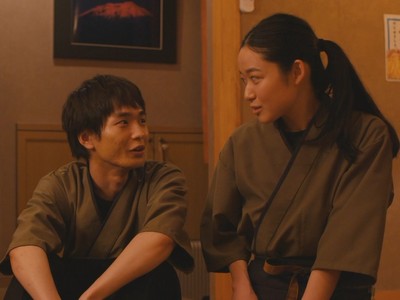
Makki holds a special place in Mieko's heart. Their characters have the most significant relationship in this series, more so than the love triangle or gay couples. Makki and Mieko's friendship is the bedrock of More Than Words, forming the story's emotional core. Makki is the first person Mieko ever loved. However, it isn't love in the romantic sense. Mieko's feelings come from eternal gratitude that Makki showed her kindness and provided companionship when nobody else would.
Platonic friends
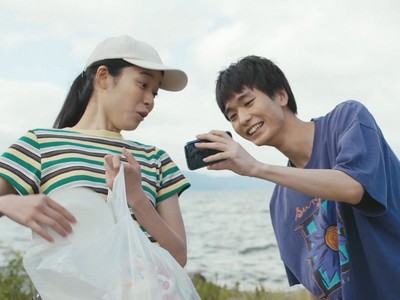
If Makki and Mieko were in any other drama, they would probably be a couple. It's tempting to pair the characters together because they seem compatible. Their personalities click, they get along well, and both care about each other. Yet, these two best friends never start dating. The aromantic Mieko is inclined towards maintaining platonic relations. Meanwhile, Makki remembers Mieko telling him she doesn't want to be with a man again. He respects her boundaries and won't initiate a romance unless she feels comfortable.
Mieko cherishes Makki's friendship dearly. She's grateful for the joy and companionship that he brings to her lonely life. However, she realizes their bond may not last forever. One day, Makki will find a romantic partner who takes precedence over his platonic relationships. Her anxieties are common among aromantic and single individuals, whose friends get coupled up and start drifting away from them. These fears are worse in Mieko's case because they also trigger her abandonment issues. She worries Makki will disappear from her future, just as her father had.
Despite her concerns, Mieko isn't possessive over Makki. She encourages Eiji or Sakaki to pursue Makki romantically. While Mieko fears losing him as a friend, she wouldn't sabotage his relationship prospects. She's glad to be his matchmaker. When Makki and Mieko argue for the first time in Episode 3, he accuses her of having feelings for Eiji. Mieko urgently clarifies the situation because she never wants to come between Makki and Eiji's romance. Although she'll become the third wheel in their friendship if they date, Mieko prioritizes their happiness before hers.
Eiji
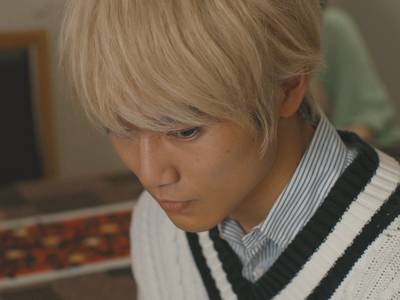
Mieko & Makki befriend Eiji, gladly welcoming him into their social circle. Their coworker is kind, gentle, and sensitive. While Mieko and Makki aren't schmaltzy people, Eiji brings plenty of heartwarming sentimentality to their friendship. His generosity is well-documented. He's always the one to give rides, offer lodging for his friends, and buy them gifts on special occasions. Eiji gets along with the teens because his caring personality meshes well with theirs.
Their friendship may seem unusual due to the age gap. Eiji is a 22-year-old adult hanging out with high school students instead of people closer to his age. However, Eiji had struggled to build relationships in the past. His shyness, quiet demeanour & crippling social anxiety made him a target for school bullies. He was a misfit who didn't have close bonds before meeting Makki and Mieko. "You two are so kind," Eiji tells Mieko gratefully during Episode 2. He's relaxed and feels comfortable being himself around them. They're the first people Eiji connects with emotionally.
Eiji is an introvert. He understands the difficulties of opening up to others in social settings. His past experiences make him appreciate this elusive friendship, knowing he may not forge the strong bonds elsewhere. After decades of loneliness, Eiji has finally found a community that accepts him for who he is. Eiji's gifts to Makki & Mieko are constant reassurances of his gratitude. I'm so grateful you two are my friends. Thank you for being a part of my life.
Eiji's sexuality
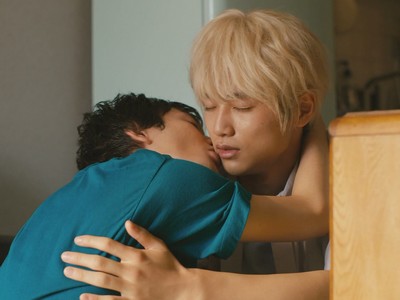
Eiji is a late bloomer who takes a while to figure out his attraction to men. He was confused during adolescence and didn't come to terms with being gay until his early twenties. Despite coming out, Eiji feels anxious about his sexuality. When Eiji ventures into a bar in Episode 2, he bails out of an intimate encounter with a stranger. A mental barrier prevents him from enjoying his desires.
Partially, his discomfort comes from not liking anonymous hookups. Eiji wants an emotional connection with his partner before pursuing a physical bond. Due to their existing friendship, he feels comfortable about hooking up with Makki and overcomes his anxiety issues. Although Eiji initiated their first kiss, he hesitated in the middle of the exchange. Fortunately, Makki took the lead and guided him through the affections. Makki helped Eiji relax, reassuring him about his same-sex attraction.
Even so, Eiji didn't burst with rainbow pride. He refrained from telling his sister until Mieko accidentally outed him. He took even longer to come out to his parents, letting them assume his romantic interest was female. No matter how hard he tried, Eiji couldn't shake off the lifelong anxieties about his sexuality. Of course, the homophobic dad didn't make things better, feeding into Eiji's psychological strain. As a result, a part of him would always feel uneasy with being gay.
Makki and Eiji
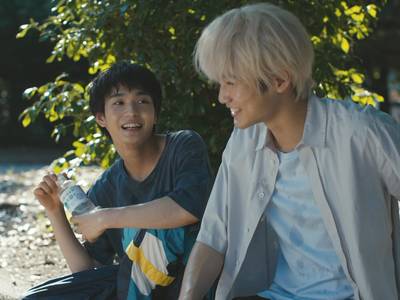
Makki's sexual orientation is a subject of curiosity in the early episodes. Eiji, Mieko, and the viewers are left speculating whether he's attracted to guys. More Than Words intentionally keeps Makki's sexuality ambiguous, encouraging us to pay attention and study his character. Episode 2 has a scene where Makki talks about liking older women. As he says this, the camera captures the subtle nuances in Eiji's expression. The series wants us to empathize with Eiji. What does he think about Makki's statement?
To our pleasant surprise, Makki responds to Eiji's love confession positively. Makki's rationale is that he enjoys spending time with Eiji, so maybe dating him will be fun too. It might seem like a simple reply from a sixteen-year-old teenager, but attraction doesn't have to be that complicated. You don't have to overthink why you like someone. You just do. Makki's thinking feels very enlightened because he has no hang-ups about Eiji being a guy. He agrees to date his friend because of their existing bond. Eiji's gender doesn't enter the equation when Makki assesses his attraction.
Makki shows the same open-mindedness in Episode 9, telling Asato he doesn't see a difference between dating men and women. Makki bases his attraction regardless of gender, which signifies his pansexuality. This revelation adds a unique dimension to Mieko & Makki's friendship, highlighting the bond between an asexual girl and a pansexual guy. They get along despite being on different sides of the sexual spectrum. More Than Words deserves credit for showcasing insightful and diverse views on sexuality. It displays more LGBTQ+ savviness than many BL dramas.
Third wheel
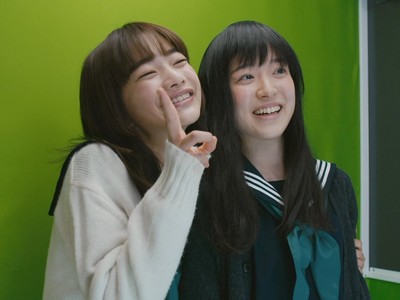
After the guys start dating, the first thing Eiji does is reassure Mieko nothing has changed in their relationship dynamic. When two friends hook up in a trio, there's a worry that the third wheel will feel excluded from the group. Yet, Eiji insists they won't neglect Mieko. This exchange is a testament to Eiji's considerate personality. He cares about Mieko's feelings, reaffirms his commitment to their friendship, and puts any lingering doubts at ease. The three of them are friends, no matter what.
Eiji meant what he said. Eiji and Makki don't isolate themselves after coupling up. They continue to include Mieko on every occasion, from parties to meals. When Mieko's mom doesn't attend her daughter's school entrance ceremony, her friends are there to celebrate the milestone instead. Impressively, the trio's friendship remains steady over the years. The guys have never made her feel unwelcome in their love nest. They defy expectations and refuse to make her the third wheel.
Despite their hospitality, Mieko isn't dependent on Makki and Eiji's friendship. She maintains a close relationship with Sakaki, occasionally hanging out with her instead of the guys. Mieko's bond with Sakaki shows she's branching out her relationships beyond Makki & Eiji. They are her closest friends, but these two aren't her only friends. Mieko is considerate enough to give the couple personal space. Even though they welcome her, she doesn't cling to them incessantly. Mieko allows the boyfriends to have alone time while she nurtures her other friendships.
Homophobic dad
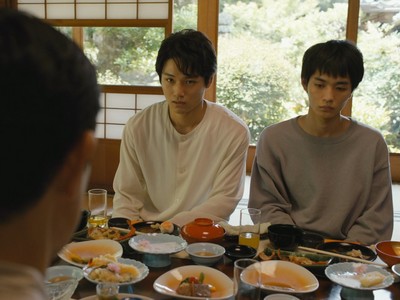
When Eiji comes out to his parents in Episode 5, his sister quickly jumps to a happy conclusion. She expresses relief, "I knew you guys would understand!" And then, the camera pans to the dad's stunned expression. He looks anything but understanding. The juxtaposition between her delightful response and his solemn face made me laugh for a second. Then, he starts spewing homophobic nonsense, and the scene stops being funny.
Later in the episode, Eiji's dad shares an anecdote about having a gay cowboy friend from America. It struck me as such a cliche that I laughed inappropriately for a second. The dad must've watched Brokeback Mountain once and thought it was a self-insert fanfic. 😆 Then, he talked about the gay bashing, and the scene stopped being funny again. I don't want to waste brainpower dissecting the homophobic dad's bigotry. My short analysis is that he has misguided thinking and needs to educate himself about LGBT topics.
Makki is upset after chatting with Eiji's father. The dad subjected him to parental disapproval, fearmongering, and a homophobic doctrine. However, Makki suppresses his unhappiness and feigns a carefree persona around Eiji. Makki opens up with Mieko, but he still won't confide in her about the contents of his discussion. Despite being an extroverted guy, he tends to bottle up his feelings. Yet, the internalized agony eats away at Makki. In this episode, he smokes his first cigarette, indicating he needs stress relief. Makki feels troubled by his relationship with Eiji.
Surrogacy
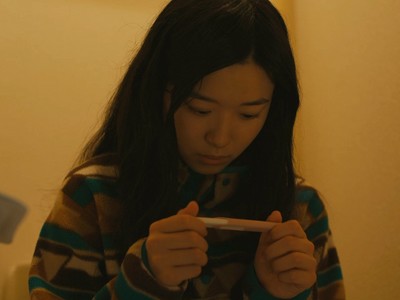
In Episode 6, Eiji's father throws another homophobic tantrum. He spews hateful nonsense about Eiji not experiencing the joys of parenthood. Shockingly, the leads retaliate by having a baby. Mieko volunteers as a surrogate, encouraging her friends to start a family and win over the dad. The storyline baffles me. I watch every scene while exclaiming, "What are they doing!? This is madness!" I can't wrap my head around their rationale. Why do they think getting pregnant is a good idea!? Please reconsider!
Mieko wants to help her friends overcome their relationship crisis. A homophobic parent distresses many gay couples, creating enough irreconcilable differences that lead to breakups. Makki already shows signs of fatigue. Makki and Eiji's inability to conceive will remain a source of conflict, but Mieko thinks she can resolve that problem. While it's naive to believe a baby would improve the situation, Mieko's intentions come from sincerity. Being a surrogate is a noble decision. Mieko is doing it because she cares about her friends and their happiness.
Maybe this surrogacy arrangement would work out if the characters lived in an open-minded society. Sadly, many factors are against them. For starters, Japan doesn't provide equal rights for gay couples who want to start families. Also, Eiji's homophobic dad intends to convert his son to a heteronormative life. Plus, Makki doesn't seem enthused about the idea. He's just going along with it. Faced against insurmountable odds, these characters barely have a plan. They didn't think about the consequences of their actions before bringing a human life into this world.
Conformity
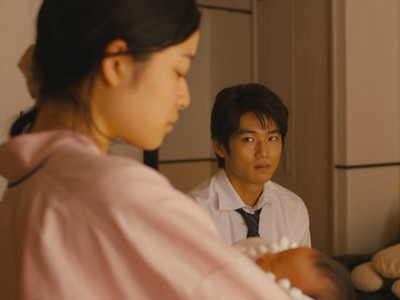
Over the years, Eiji has shown an inclination to conform to societal norms. You may have noticed the changes to his mature appearance. He begins wearing suits and doesn't dye his hair anymore. Additionally, Eiji had been studying a skilled trade in a niche industry. Yet, he quits this occupation to work an office job for his dad's company. Eiji's behaviour changes as he grows older. He wants to be more mainstream instead of pursuing his individuality.
Mieko goes through a similar transition. She enrols in cosmetology school to pursue a beautician career, a surprising choice for someone who dislikes being called "cute". Mieko used to see herself as an ugly duckling who didn't fit in with the norm. In Episode 6, she confessed to struggling with her femininity due to her asexuality. "How did I turn out to be this kind of woman?" As Mieko grows older, she realizes being asexual doesn't diminish her womanhood. By conforming to a stereotypically female occupation, Mieko finds harmony between these two aspects of her identity.
Conformity tends to have a negative connotation. Yet, fitting in with society is a desirable prospect for most people. It isn't easy being different from the norm, especially when you face hardships as a gay man or asexual woman. Eiji and Mieko pursue surrogacy to conform to the traditional notion of starting a family. They believe gay couples can fit in by behaving like many straight couples, becoming parents and raising children. Makki tries to play along, but he isn't committed to the same vision. He can't picture himself as part of a conventional family with Eiji and Mieko.
Hair
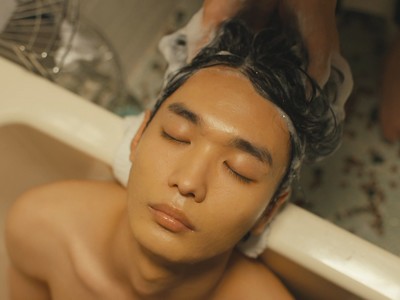
Hair has meaningful symbolism in More Than Words. The characters' hairstyles reflect their mindset at different intervals of their lives. Eiji is the clearest example. He begins this series with striking blonde hair, standing out defiantly from everyone else. Midway through the series, Eiji doesn't dye his hair anymore and reverts to a traditional colour. This new hairdo shows Eiji's eagerness to assimilate with the norm. He wants to be like everyone else, just as his dad instructed.
Similarly, Mieko goes through a few different hairstyles throughout the series. The experimentation shows she's still figuring out her identity. Mieko switches to bangs for a while, almost resembling Sakaki. The new hairdo hints that Mieko wants to change herself to look "cute", like her friend. Yet, Makki upsets her by stating he enjoys her previous hairstyle more. Mieko is sad because she fails to fit in and feels like a misfit. Later, she switches back to her early hairstyle with minor differences. Mieko is comfortable being herself again, even though she has made a few changes.
Makki alters his hairstyle drastically after the time skip in Episode 8. I'm sorry for offending anyone with a similar image, but his new hair looks hilariously awful. It gives the impression that Makki may have given up on himself. 😓 The dishevelled appearance is intentional. Makki chooses an offbeat haircut, indicating his unconventional way of life. He doesn't care about looking different. Makki finally cuts his hair after making up with Mieko in the last episode. It shows he has gotten rid of the baggage and goes back to being his old self again.
Outsider
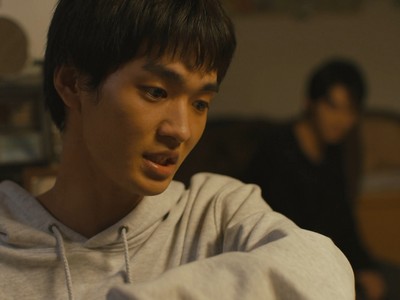
Makki leaves in Episode 7. He abandons his boyfriend, his pregnant friend, and their soon-to-be family. The trigger is when Mieko lies about Makki being the biological father. She wants to make him feel included, but the deceit only highlights Makki's lack of connection to the baby. Eiji and Mieko are the birth parents, whereas he's totally unrelated. Due to the law, there's no status recognizing Makki as the adoptive dad. He doesn't have a legal role in the child's upbringing.
Makki's discomfort goes beyond Mieko's lie. Since the beginning, he wasn't as committed to surrogacy as Eiji or Mieko. Having a baby appealed to them. In Eiji's case, he hopes the child can win over his family's approval, so they wouldn't feel disappointed in him anymore. In Mieko's case, she's thinking altruistically. She wants to have this baby for her friends, not for herself. Her motivation is helping a childless gay couple out of the goodness in her heart. Eiji and Mieko are more invested in the pregnancy than Makki, who simply goes along with the plan.
Above all else, Makki's biggest insecurity is that he has become an outsider. The pregnancy brings Eiji and Mieko closer because they now share an exclusive family bond. They think similarly and spend all their time together, like a couple expecting their first child. Their intimacy makes Makki an awkward third wheel. Initially, he internalizes the negativity, bottling up his uneasiness for months. Makki finally loses control in an argument, revealing that he feels jealous, marginalized, and betrayed. Unable to cope, Makki isolates himself before they alienate him further.
Family bonds
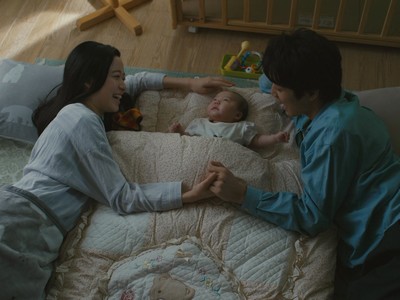
After Makki leaves, Eiji and Mieko form a conventional family structure. They become the father & mother of a child named Shiho. Homophobia wins as Eiji's dad succeeds in getting his gay son to settle down with a woman. Committed to parenthood, Eiji convinces himself that he loves Mieko and confesses his feelings for her. Despite their familial bond, there's no attraction between them. The story hints that Eiji still misses Makki, but he must repress his desire to focus on being a dad.
Mieko tells Eiji, "You're like my friend, my big brother, my younger brother, and my son, all rolled into one, which I really love." Notice how none of her descriptors have romantic connotations. She only sees him in terms of friendship and family. Mieko adds that Eiji is "free to do as he pleases", giving him permission to pursue extramarital relations. When Eiji proclaims he loves her, Mieko mentions Makki on purpose. She implies he's trying to replace his ex with her. This subtle exchange requires viewers to interpret her intent, but the gist is that Mieko won't respond to Eiji amorously.
In an ironic twist of fate, the asexual Mieko has become a mother. This role falls onto her unexpectedly, but she enjoys the experience. Being a parent makes her happy, filling the void in Mieko's heart since her dad left. A bonus is that Mieko mends the bond with her mom, taking steps to get involved in each other's lives. Mieko grew up deprived of family warmth, but now she's surrounded by it. Eiji reassures her, "You're allowed to love yourself more." The series began with Mieko doubting whether she was capable of love. Her emotional journey has reached an apex.
Makki
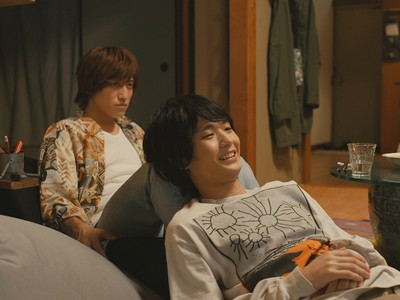
Makki and Asato
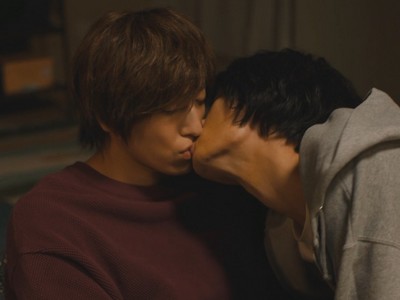
Makki meets Asato, his new love interest introduced in Episode 8. As neighbours and former classmates, they quickly form a cozy rapport. Makki showcases his best personality traits when they're together. He's playful, spontaneous, affectionate, and a little flirty. It's easy to understand why Asato falls for him because Makki energizes his quiet, monotonous life. Asato articulates his feelings in Episode 9: "Eating with him made food taste much better than eating alone."
Asato shares many similar qualities as Eiji. The story deliberately makes Makki's two love interests carbon copies of each other. Both Eiji and Asato have quiet, introverted personalities. They are attracted to men but appear reserved about their sexuality. Also, they suffer similar issues with their families. Asato resents his strict grandfather, mirroring Eiji's fraught relationship with his homophobic dad. It amuses me how Makki's new boyfriend is just like his ex. You're falling for the same archetype again!
Asato is lousy at sex, but Makki stays with him anyway because their bond goes beyond physical affection. During Episode 9, Makki cries when Asato washes his hair. In this story, hair is a symbol that reflects a character's emotional state. Makki grows sentimental over Asato's gentle touch, remembering how nobody had treated him this tenderly since Eiji & Mieko. Later, Asato dries Makki's hair in an extended scene. Viewers may recall a similar exchange with Eiji before he initiated their first kiss. The series wants to highlight the parallels between Makki's two relationships.
Asato vs Eiji
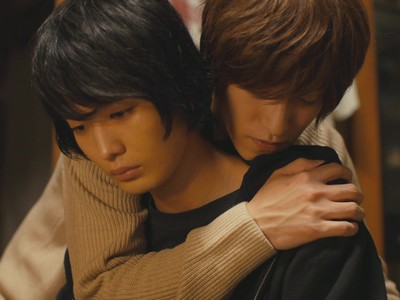
Despite their many similarities, the series emphasizes the differences between Asato and Eiji. For starters, Asato stands up to his family. He leaves home at a young age and seeks his independence. Asato reconciles with his grandpa in the finale, but that domineering man has no more power over him. The same cannot be said about Eiji, who remains shackled to his homophobic dad, working for the family business. Eiji lacks Asato's courage and conviction to pursue his freedom.
Asato's hairdresser storyline echoes similar themes. He reaches a critical point in his job. Asato is expected to advance his career to a professional level, even though he doesn't have a strong passion for it. Society expects Asato to be ambitious. Get the promotion, develop new skills, and continue climbing upwards. Yet, Asato follows his heart and stays where he is comfortable, going against the conventional path. This subplot highlights Asato's nonconformist attitude. He wants to stay true to himself, even if it means challenging traditional norms.
More Than Words proves that Asato is not the same as Eiji. They may share similar personalities and traumatic experiences, but their approaches to life are different. Asato is braver, more independent, and remains resilient against the pressures of conformity. Unlike Eiji, Asato is a compatible partner for Makki due to their similar values. Best of all, they inspire each other to heal emotionally. As Asato repairs the bond with his grandfather, he encourages Makki to do the same with his friends. After being traumatized for years, Makki finally has his breakthrough.
More Than Words Ending Explained
Ending
Happy ending
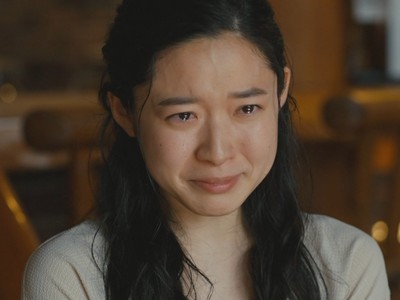
More Than Words has a happy ending where the main characters apologize to each other years later. After a long period of ceased communication, Makki and Mieko reconnect by discovering they have a mutual acquaintance. Their high school friend Asato still keeps in touch with both of them. Mieko is desperate to reunite with Makki and begs for his contact info. However, Makki wants to avoid an awkward encounter until Asato eases him into the idea. Asato encourages his boyfriend to heal emotionally.
Makki meets with Mieko and Eiji, a happily married couple with a child. Eiji is the first to give a tearful apology. He's sorry for getting together with his ex's best friend, choosing her over him. Next, Makki apologizes for running away from the problem. They were supposed to be a trio, planning a family together. His best friend Mieko got pregnant for him, but then he ditched the group midway and triggered her abandonment issues. Mieko smiles through tears and responds with, "Me too." She has felt guilty about driving Makki away and causing him anguish.
Although the leads don't exchange much dialogue, their heartfelt sincerity reverberates in the scene. They're all sorry for hurting each other and blame themselves for tarnishing their precious friendship. After these apologies, there's an unspoken understanding between the three of them. They don't need to reminisce, give reassurances, or promise to make amends in the future. All the characters are in sync about how remorseful they feel. Their forgiveness doesn't need to be stated explicitly because the strength of their empathetic bond transcends words.
Eiji and Mieko
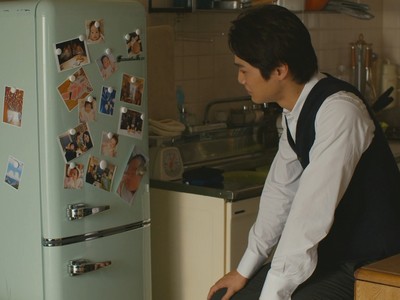
After their meeting, the characters say goodbye in the parking lot. Eiji has misplaced the car keys while Mieko chastises her husband. The forgetfulness references one of Eiji's old habits, indicating he still retains the same endearing qualities. As Makki observes their interactions, he jokes that they resemble a married couple, a statement tinged with bittersweetness. Makki acknowledges that Mieko and Eiji are more compatible than he was with his ex.
Once Mieko and Eiji arrive home, they casually chat about their happy reunion. Yet, both characters seem restrained, not speaking every thought aloud. As Mieko leaves Eiji alone, he quietly observes the apartment with photos of his wife and daughter everywhere. To the outsider, he's in a loving home surrounded by family bliss. Interestingly, a few pictures of Makki are in the mix, showing that Mieko and Eiji had never excluded him from their family. Despite his absence all these years, Makki remains integral to Mieko and Eiji's memories.
Eiji seems like a devoted husband and father blessed with a picture-perfect family. He smiles at the photos, appreciating his good fortune. Yet, the scene ends with Eiji crying as he clings to an old memento from Makki. He misses his ex and feels devastated about losing him. Eiji made this decision years ago, choosing a traditional family structure with Mieko over an unconventional romance with Makki. He must give up a part of his happiness to gain this idyllic life with a wife and child. Whether this trade-off makes him feel fulfilled is up for your interpretation.
Makki vs Eiji
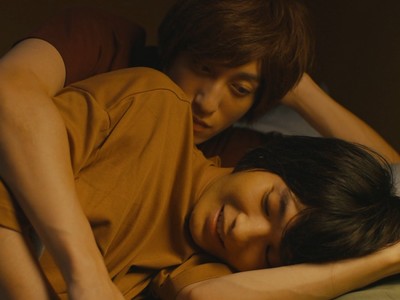
After the emotional reunion, Asato has been waiting in the wings and gives Makki a comforting hug. Makki finally recovers from the trauma of losing his best friend and boyfriend for many years. Mieko and Eiji were sad too, but at least they had each other and a cute daughter. In contrast, Makki had nobody. He suffered alone, coping with the neglect, regrets, and torment in total solitude. Thankfully, Asato arrives in his life and gives him some much-needed love.
Asato asks how his boyfriend feels about seeing his ex again. Makki admits his feelings have softened. Makki is now curious about meeting Shiho, the daughter he was supposed to raise. Yet, Makki isn't ready to get chummy with Eiji. He needs time to sort out the complicated feelings about his old lover. Eiji's betrayal cut too deep of a wound, not something they can move past after one apology. They may never be on good terms again. Makki's reply reassures Asato he's still number one. There's no risk of Makki getting back with his ex when he already has Asato.
It's important to note that Makki also cares about Asato's emotional journey. After Asato reconciles with his grandfather, he finds Makki waiting for him outside the doorstep. His boyfriend is thinking about him and wants to provide support. They inspire each other to heal in a healthy, mutually loving relationship. While Makki lacks the happy matrimonial life that Eiji and Mieko have, he gains a valuable romantic partner who cherishes him. Since Makki doesn't conform or compromise his attraction, he's rewarded with a compatible lifelong companion.
Ending explained
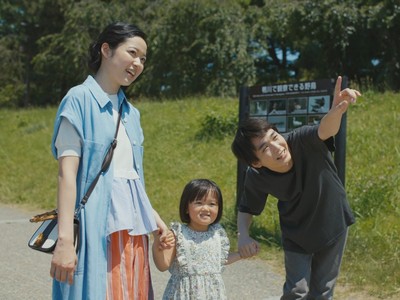
The final scene shows Makki meeting with Mieko and her daughter Shiho. Notably, Eiji is absent. The series ends the same way it started by focusing on the bond between Makki and Mieko. Their relationship has always been the most fundamental in the story. The characters take a walk outdoors in the middle of the day. Interestingly, it's the same route Makki & Mieko embarked on when they first met. More Than Words deliberately uses the exact location to highlight the characters' growth.
Unlike the brooding premiere, the circumstances in the finale are optimistic. Mieko and Makki enjoy a natural rapport, cracking inside jokes and making lighthearted chatter. These two aren't adversaries anymore. They're back to being close friends. After finishing the walk, Makki says goodbye and departs in another direction. It's symbolic of how he leads a different life than Mieko. Yet, Makki makes reassurances he'll meet Shiho again. He reaffirms his conviction in being a part of Mieko's life. Makki will return and doesn't abandon her like before.
More Than Words makes the viewers ponder Makki & Mieko's current relationship. They may be amiable, but are they as close as before? How much of a role will Makki play in Mieko's life beyond these afternoon walks? The series doesn't offer an answer, but it hints at hope and positivity. Mieko once described her feelings for Makki, "He's unlike a friend or lover, but I don't want to separate from him." Their bond feels so precious that it's more than words can describe. We don't know what the future holds. We'll just have to believe in them and their commitment to each other.
More Than Words Episodes
Episode Guide
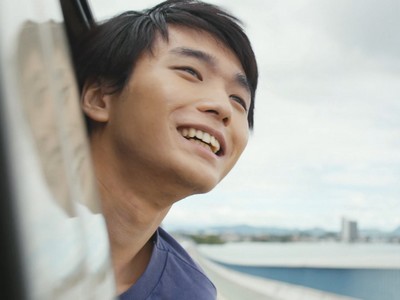
- Start Date September 16, 2022
- Length 6 hours
- Episodes 10 episodes
- Episode Length 40 mins
More Than Words has a total of 10 episodes. Each episode is around 25 to 35 minutes long. The last episode is around 40 minutes long. It is a long BL drama, and you can finish the entire series in under 6 hours. More Than Words released its entire season on September 16, 2022.
Episode Reviews
Episode 1
It's a decent start to the series that introduces the characters memorably. Mieko and Makki's actors give natural performances on camera. They share a comfortable and convincing rapport.
Episode 2
I enjoy the warm friendship forming between the leads. Eiji's insecurities seem intriguing. I like how the series navigates his attraction toward Makki, whose sexuality remains ambiguous.
Episode 3
I'm really enjoying this series so far. As the story explores the blurry lines between friendship & romance, it produces riveting relationship drama. Makki's response to Eiji's confession is surprising.
Episode 4
While I'm not too invested in Makki and Eiji as a couple, their first kiss is an exciting moment. I enjoy Mieko's introspection as she watches her friends develop a romance. What a fascinating character.
Episode 5
I'm glad this episode focuses on Makki. I know Mieko and Eiji's characters well, whereas Makki seems like an enigma. It's interesting to see how he copes after chatting with Eiji's homophobic dad.
Episode 6
OMG. I don't know how I feel about the characters having a baby together. Their rationale doesn't seem comprehensible. Their threesome at the end is mind-boggling. This plan is batshit, right!?
Episode 7
This baby drama is getting out of control. They should have the critical conversations BEFORE going through their pregnancy plan, not AFTER. Honestly, I understand why Makki bailed in the end.
Episode 8
Seeing Mieko and Eiji start a family together makes me so upset for Makki. 😢 Ugh, Eiji sucks. It's early days, but I already enjoy Makki & Asako's vibe more. I hate Makki's new hairstyle, though.
Episode 9
I like how the entire episode is dedicated to Makki & Asato's romance. I know Makki's character way better than before, and these last two episodes have showcased his endearing personality.
Episode 10
Overall, I'm satisfied with the happy ending. The series struggles to redeem Eiji's character, but I'm far more invested in Makki and Mieko's bond. I'm glad these two have mended their relationship.
More Than Words Information
Links
- Amazon Prime More Than Words Amazon Prime
- MyDramaList More Than Words MyDramaList
This series completely broke me, I'm scathed, taking a break from pensive Japanese bl lol. As usual l love your analysis especially the part on Meikos asexuality and aromaticism. I think there's something to be said that she's this way and settles with Eichan who is gay? That scene where they are lying with the baby kind of indicated to me that although they loved each other their relationship was not going to be based on romantic love or sex.
Thank you for your comment! I hope you'll recover in time for the next pensive Japanese BL lol. What I love about More Than Words is that it encourages viewers to relate to the character's emotions. It doesn't always explicitly state how the characters are feeling. You have to observe their reactions and view each situation from their perspectives. The more empathetic you are, the more you can appreciate this series. A story told through empathy is so powerful.
I love that scene with Mieko, Eiji, and their baby. I interpreted it the same way as well! Although they love each other, the relationship isn't based on attraction. He tries forcing himself to play the role of a devoted husband, but she goes, "Nuh-uh, I love you like a brother."
This family arrangement works out well for Mieko. By starting a family with a gay man, she gets to experience motherhood without needing to compromise her aromanticism or asexuality. Unfortunately, her parental bliss comes at the expense of Eiji & Makki's relationship. Mieko gets what she wants, but her friends don't. The trade-off is part of what makes this story so poignant.
This series also left me broken and yeah I'm also taking a break from watching other bl dramas and listening to previous bl series theme songs for recovery. I will rewatch this before I move on to another because there might be something that I've missed. I'm confused about the pregnancy time and determining who is Shiho's father. They did a 3way but I'm thinking that there is more before that.
(My imagination tells me that Makki and Meiko did it first. Meiko really wants the baby to be his but that is just my conclusion. I'm looking for the manga to ease my curiosities.)
The ending is depending how the viewer perceives watching the series and to who they relate most.
I love the character of Mieko and the acting. She is so strong and noble in their friendship. She is the main protagonist. For me, it's a happy ending for her because she got reconciled with Makki which is very important to her.
I'm sad for Eiji but his character is realistic and happening in the real world. The scene with him looking at the photos is so heartbreaking. I mainly saw photos of Shiho and none with Meiko and him together. He became his father wearing the cowboy hat. Thinking about what is what normal as society visions before his identity (a coward, sorry for the word)
Makki is my biased so I want him to have a happy ending. I want to see another episode showcasing his bubby and talkative character after he reconciles with Makki and Eiji. It's breaking that he lost his persona as the story progressed.
The final scene where Meiko and Makki are walking along the path like in the 1st episode is so meaningful. Now there are 3 of them with Shiho and Makki saying see you again is very touching and means moving forward.
Asato – I want to thank him for being a good person and making the three meet again. I want to see Makki and Asato happy after the reconciliation. I want to see a scene where Makki smiling goes to Asato after the final scene of the series. For me, that should be a final episode ending credit scene.
I don't really do this commenting on the internet. Sorry for venting out.
Thank you for this great review and explanation.
I just finished watching the series and cannot move on from it. (EP10 makes me cry insanely 😂)
I love how the story goes and the character's progression. This series is really well crafted.
Already added to one of my best BL this year.
Brilliant drama, sensitively portrayed, beautifully filmed, wonderful acting. I was hoping for a happier ending but recognize that this was the only fitting ending for people who must live with the choices they make in life. Your analysis was so insightful and helped me understand some of the subtler aspects of the story. It also helped me feel a little less pain for the characters. The scene with Eiji sobbing into Makki's cloak that he had put away into the dresser drawer years before, but then took out, burying his nose in it as if to catch the faintest scent of Makki — what a powerful, wordless scene of deep misery and regret.
This series had me crying for the last few episodes. . . I view it as a more tragic series since i can relate to it. Ultimately it had me invested throughout and i would rate it highly, even though it ended bittersweetly. ༎ຶ‿༎ຶ
is it just me that noticed when makki cried after having a dream and he told eiji that the dream was about him smoking in a white apartment alone and waiting for someone but no one showed up. but when he left eiji and mieko he was living that dream except the only difference was that he was with asato.
I agree with a lot of what you explored here, but there’s also a big part that I think gets overlooked. Let me preface this by saying that I am asexual. I’ve always known, yet couldn’t describe it in words because I didn’t know them. Since discovering the term ‘asexual’ I’ve been using it to describe myself for a few years now. I am on also on a similiar spectrum of asexuality as Mieko – I have no need for a sexual realtionship whatsoever.
With that, let me say the biggest part of your analysis I disagree wirh – about Mieko being selfless and doing a noble act. Because that couldn’t have been further from the truth. As an ace (on the further part of the spectrum) it is very difficult to imagine having sex with anybody at all. Even for a loved one I wouldn’t be able to do it, mayby if somebody was holding a gun to my head. And that’s “just sex”. But going through a pregnancy? I know very few women who would willingly put themselves through a pregnancy just to give up the baby afterwards, but as an asexual person? You simply do not do that, unless you get something out of it of course. And Mieko didn’t. Because she had no intention of giving up the baby after it was born.
Mieko knew damn well what she was doing by offering to be a “surrogate”. She knew just how much Eiji wanted to be “normal” and how much she longed for that too. She saw an opportunity so she offered, and as predicted Eiji jumped on it right away. Basically, both Mieko and Eiji used each other to get what they wanted, casting Makki and his feelings aside. Heck, Mieko even tried to manipulate Makki by saying the baby was his, just so he would stay with her.
I know I mayby sound too harsh, but when you live the asexual life, you know what is realistically possible to do and what isn’t. I even asked my asexual friend for her opinion and we came to the same conclusion. Whatever drove Mieko to offer the “surrogacy” did not come from a place of nobelity and selflesness, there was a selfish motive from the very beginning. It may have been an uncounciouss one, but it was there.
Which really sucks, because it made me dislike Mieko and Eiji very much and I had problems feeling any kind of sympathy towards them afterwards. Adding salt to the injury is the fact that Mieko is the one who ends up with her dream life, while Makki is left pickig up his own pieces bit by bit. I also wish they haven’t used their asexual character like this. Mieko was so interesting, with a solid build and background, but they had to go the unrealistic route and ruin it in the middle. It’s almost like the media can’t fathom the A in asexuality, we’re always eighter broken, fixable, haven’t found the right one or we can turn off the asexuality for a little bit for somebody. That’s just not how it works.
That's so far from a happy ending.
Before they had 3some, they should have looked forward to what would happen in the future.
They should have agreed that eiji will have the baby, because the problem is eiji's parents wanting to have a grand child.
What's the point of Makki becoming the father? That would not resolve their problem with Eiji's parents.
I got so mad when Makki started getting jealous when Eiji is taking care of the pregnant Meiko.
Meiko did it for them but Makki took it differently.
After abandoning the 2, I got so mad at Makki. He deserve what happened to him
But after their reunion, it showed that they still love each other,
But there are no more episodes!!!!!
I need a season 2 or a movie.
I want those 2 love birds to get back together. Or atleast fully move on before ending the story.
Okay I'm fine now.
Sorry for talking too much 😭
I just finished the show and i came inmediatly to read your review and i´m glad we share almost the same opinions!! (i loved Makki´s long hair haha)
Also, i´m so thankful for your explanation while talking about their sexualities, i was confused with Meiko and Makki, now i understand even more their reactions and why they did what they did.
In my case, i was still upset with Meiko and Eiji decision, even after their reunion and apology however, it was what Makki needed to move on and that´s fine.
i cried so much in that part.
Anyway,,,
Once again, thank you for your work on reviewing this complex and wonderful work!
I loved this series but my only regret is reading the comments on it. This series was meant for those with empathy to extract the emotions and the meaning in the story but there was little empathy in the comments. There was typecasting and/or favoritism in the evaluations.
Meiko – selfless, selfish, non asexual behavior? How? Asexuality has spectrums, it's not right to say what she can or can't do, and even the evaluation that she is asexual theoretical. Her actions, just like the others were based on the same premise and mistake.
Makio – "deserves better character"? I'm not saying he doesn't but one must truly see it from his outlook. He is wise beyond his years and very observant but still very young. Wisdom without information let's you see a wide world that you can't really understand. You tend to get lost, jaded, and cope by being extra happy or cold. Even his relationship with Asato is almost a rebound based on the principle "if I knew then, what I know now, what would I do differently?" His split was him not fully understanding his own emotions, feeling useless and jealous while seeking the premise and letting the mistake get the better of him.
Eiji – hated, coward, almost the villain of the story. This is the biggest typecast example. Guy has disapproving parent and actions are taken to please the parent that destroys relationship. More often than not, that guy is an idiot for his choice in dealing with it but not this time. Eiji refuse to end the relationship for years and was the first to walk out from the feast fiasco. Makio was the one who suggested the breakup to please the father, questioning if the relationship is right if it causes such grief. How is Eiji the coward? Because he listened to the idea of having a child (which he also tried to pull back at the last second for). Despite everything, who doesn't want a scenario where your parents approve of you? His issue is being too nice and people pleasing. He let himself go with the flow too much and tried to take on as much fault and responsibility has he could since, as far as he sees it, this is all his fault. The scene with him, Meiko and the baby is where I saw someone projecting their fear of loss and sense of guilt onto the only happiness they have left. Which is the premise.
This entire series felt to me like a search for happiness from three people who didn't know what exact that was or where to find it. Meiko sought family and understanding, Eiji sought acceptance and Makio sought purpose. The problem was when everything came to a head a seemed to be in jeopardy, they choose terribly for their solution. As any relationship expert will tell you, saying let's have a kid to save the relationship is doomed in every sense.
Maybe I'm just weird. I spend a lot of trying to understand the complexity of human thought and emotions. Perhaps that's why I don't want to judge as harshly. Though I cursed my head off at the father during the first baby meet scene. I also have a running theory that if the "friend" who gave him the cowboy hat story is real, then the reason he was caught was because that "friend" confessed his feelings for the father and he told them where he was. He probably didn't expect the outcome but it was still his fault.
Basically, everything was perfect until this homophobic father decided to be egoistic and selfish. He can burn and rot in hell or if someone plotted a murder and killed him after he bitched like a shitty homophobe that he is, that would have been great. But apparently, the main characters decided to "listen" to his demands and it obviously lead to this separation. So a lesson to be learned here is that any homophobe (no matter who he is – father or family) bitching about your non-straight relationship dares to exist, then KICK THEM OUT OF YOUR LIFE OR LEAVE THEM.
Saya merasa sangat tercekik dan sesegukan sambil menekan dada untuk tidak menjadi "tak terkendali". Serial BL Jepang pertama yang cukup menguras emosi dalam memahami karakter setiap pemeran utamanya. Saya tidak akan banyak bicara di sini. Saya juga berterimakasih atas analisis setiap karakternya baik dari dialog, alur cerita maupun hal kecil dan mendetail seperti perubahan model rambut Makki yang membuatku shock yang mengisyaratkan keputusasaannya. Juga komentar" lain yang memperluas pandanganku tentang karakter mereka lagi. Semuanya sangat membantu dan menjawab sedikit kebingunganku. Jujur saja aku sangat kesal terhadap tokoh Eiji yang tunduk patuh terhadapa sikap dan tuntutan ayahnya, tapi kemudian aku menjadi lunak setelah melihat adegan mencium jaket makki yang tersimpan di laci dengan terisak. Itu menggambarkan bahwa dia tidak hanya bahagia memiliki keluarga yang sempurna, namun juga menderita dengan pilihannya untuk tidak mempertahankan cintanya bersama Makki. Aku ingin season 2 untuk menenangkan diriku. Aku harap semua tokoh yang tersakiti menemukan bahagianya terutama Makki dan Eiji. Aku juga senang dengan kehadiran Asato untun bersama Makki. Jika aku rangking maka biasku adalah Makki setelahnya adala Eiji, Asato, Meiko (egois)
While I would never say that More Than Words belongs to the BL genre, it's definitely an amazing Japanese dorama focused on queer characters. Maybe one of the best Japanese doramas I've ever seen, to be honest.
I really appreciate how contemplative it is and how it lets the viewer to ponder about the characters' feelings and motivations, as you pointed.
I mostly agree with your review, although I struggle to call the finale a happy ending.
If anything Mieko does sort of have a happy ending, where she is able to regain her relationship with Makki to some extent, finds bliss in motherhood and gets to reapproximate with her own mother, which was a big issue for her. I also find it enlightening that she is displayed as the one with the clearest understanding of their lives by the end. The moment Eiji starts doing weird love confessions to her, she is quick to bring Makki up and dismiss it.
It being a happy ending for Makki is… Well, I appreciate he was able to deal with his trauma, managing to meet and talk with Mieko and Eiji. But in this sense, I find the final scene with Mieko and Shiho specially ingenuous in how it shows that Makki was able to recover from his "I hate women and children" speech… While deliberately excluding Eiji. Yes, both characters said sorry to each other. And yes, they sure were being honest about being sorry. But that is no magic wand that makes them happy. There is no undoing of what happened and there is a very big undertone that what happened between them broke Makki's life beyond repair.
And for Eiji… Oh, poor Eiji. Actually I find it a very interesting take that Eiji is the only character who shows a clear position about their own sexuality and ends as the one who betrayed it the most. While Eiji positively says he is gay, is shown trying to pursue his sexuality, and even comes out to his parents by his own decision, Meiko and Makki never really state they are asexual, pansexual, nor anything else, rather just doing whatever they feel compelled to. Yet they are the two who manage to live their lives as they wanted, an aromantic relationship for Meiko, and dating whomever he wants for Makki, while Eiji ends deprived of the one thing he ever said he wanted: a gay romance.
Being honest, I was expecting the dorama to give some sort of redemption to Eiji's character. Once the baby storyline got so far, I was assuming it would come in the form of him denying his father the right to meet the baby, or simply leaving the room while his parents were there, as a way of stating that "yes you got the baby, but you lost me in exchange" to his father.
But since even that didn't happen, what we are left with is a broken Eiji, who gave up on everything to please his father and yet finds no fulfillment in that. An Eiji that tries to find someone to confide outside and fails, in the form of his ex-boss who when approached says that it's his problem; an Eiji that makes an awkward love confession to his wife and gets quickly replied with the name of his ex lover; an Eiji that carries guilt about how he is in a way responsible for destroying Makki's life; and finally an Eiji who can't be honest even to Meiko, the only person in position to try understanding him, and ends crying alone while looking to the pictures that represent his life.
I mean, even his sister, who was clearly standing up for him in their young, in the end brings their parents to the hospital without telling him in advance, signing how even the bond their were able to form due to Eiji's outing was not enough to provide long-lasting emotional support to him.
To me Eiji is shown as a tragic character teared up beyond repair by society's expectations and his own desires, ultimately unable to deal with them in any meaningful way and left completely emotionally isolated.
It was a very heavy watch and the second half had me in angst scene after scene, but I think it is an amazing dorama, that succeeds to show multiple queer characters who are all complex and have meaningful emotional journeys, while not shying away from show that real life doesn't always look pretty and some things do break beyond repair.
I would like to watch it again after a couple years and see how my feelings towards each scene change.
Season 2 please where mikki and ejie can have their happy ending since they complete their goals having a child huhuhuhhu please
I have a lot of things to say about this series but I will not attack the characters because the characters are as smart as the writers write them to be. Blame the writers who were probably on crack writing this because it is indeed bizarre but in all fairness, it worked. Hahaha.
I don't think this was a happy ending. Makki is still trying to mend his broken heart but has not fully healed. Eiji is obviously feeling terrible regret and missing his ex-boyfriend.
Honestly, this gives me the same vibes as Life~Love on the Line. One partner gets suade by society's view of being "normal", gives in and attempts to marry a girl. The main difference between this mess and Life~Love on the Line though is that the latter gives us a very satisfying resolution by making Akira realise his love for Yuki. Akira was punished and looked for Yuki for years so you can really feel the remorse and the redemption.
Honestly, I was low-key expecting the same thing to happen. That would have been extremely satisfying in my personal view, but it's not the path the writers chose to take. To each their own. Couples break up anyway and honestly, Makki is better off without a disloyal person. He dodged a bullet. I JUST REALLY WISH they hired a more attractive actor to play Sugimon. LMAO sorry! Like if you wanted Makki and the viewers to move on, at least give us an eye candy cuter than Eiji.
I love the style of the series in taking time in acting the scenes out. The dead air, the awkward moments, it didn't feel rushed at all. It was all beautiful actually and what made this series unique. Like there were just moments of long pauses. It all worked out to create this vibe.
Overall, I enjoyed the style. This bizarre love triangle, not so much. I liked Makki's actor he was very chill. Eiji's actor needs more workshop I think. Hahahaha. Life~Love on the Line is still the best Japanese BL sorry. Bye enjoy. Hahahaha.
Wonderfull review, i just rewatched this jdrama, after 2 years, it made me cry again. The caracthers are a copy of so many persons and situations in society, Mieko an asexual, Maki as Pansexual although we never see him atracted by any woman, just been free, and the poor Eiji that like so many men before had not an open minded upbringing, a coward?
Perhaps, or a person who loved his dad to much, in any case, I think his dad did not deserve the big price of a grandaughter at the expense of his kid happiness, the big looser to my was Maki, he will never recover from the loss, not even his new partner seems comitted to be his boyfriend, maybe down the line they fall in love with each other, but for this moment they are just trying to not feel the lonliness.
The big winner is Mieko, she feels loved and cared by her mother, has a child to give love too, and a husband that will never be allowed to touch her, and a friend that despite her betrayal has come back to her side.
As for Asato, he is a winner cause he is recovering from his trauma, and has Maki's support, he will easily find another love interest, he does jot seem in love with Maki, also he knows that Maki's grand love is Eiji.
I am very much devastated by this roller coaster of emotion-drama and I think I would need some time to recover. Everything was going great untill it started to felt bittersweet. I think everyone of the trio is the most real depiction of what people with different sexual orientation go through. The unfolding of story is the is what I loved the most.
But one thing I am confused about is the pre pregnancy situation. Why did Mieko lied to Makhi that child was his. Did she do it with Eiji behind Makhi's back. Because I don't see any other reason for lying.